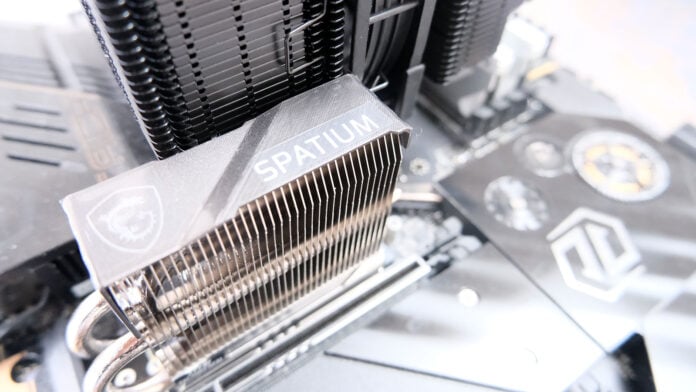There are SSDs and there are SSDs. The race to produce the fastest consumer drives took a positive turn when controller manufacturer Phison announced the E26 controller. Found in numerous models and mated to high-speed NAND, it’s the go to solution for supreme performance.
The maturation of PCIe 5.0 drive technology heralds opportunity for running even more quickly. The typical straight-line 12GB/s read and write is usurped by the very latest models touting faster NAND. A great case in point is the MSI Spatium M580 Frozr that offers up to 14.6GB/s read and 12.7GB/s write. Stick that in your pipe and smoke it, SATA drives.
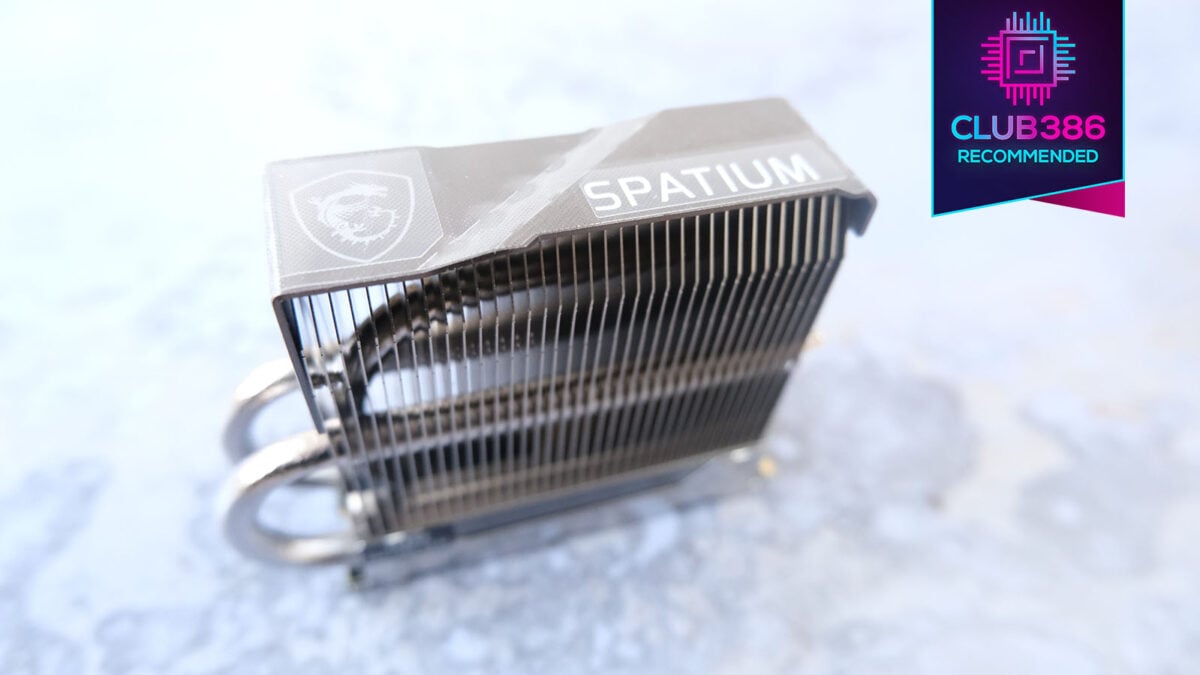
MSI Spatium M580 Frozr 2TB
£300 / $300
Pros
- Supremely fast
- Excellent cooler
- Top-notch NAND
- Up to 4TB capacity
Cons
- Incremental upgrade
Club386 may earn an affiliate commission when you purchase products through links on our site.
How we test and review products.
MSI is able to turn up the wick by using a standard E26 controller allied to faster 232-layer NAND from Micron. You may recall the M570 Pro Frozr that I took a look at recently. Its 2,000MT/s-rated flash is supplanted by bleeding-edge 2,400MT/s for M580 Frozr. Putting the duo together, there’s enough intrinsic throughput to almost saturate the PCIe 5.0 x4 interface.
Specifications and Analysis
| MSI Spatium M580 Frozr | 1TB | 2TB | 4TB |
|---|---|---|---|
| Controller | Phison E26 | Phison E26 | Phison E26 |
| NAND | 232L Micron TLC | 232L Micron TLC | 232L Micron TLC |
| DRAM | 2GB | 4GB | 8GB |
| Interface | PCIe 5.0 x4 | PCIe 5.0 x4 | PCIe 5.0 x4 |
| Sequential Read Speed (MBps) | 13,700 | 14,600 | 12,400 |
| Sequential Write Speed (MBps) | 10,300 | 12,700 | 11,800 |
| Random Read IOPS (K) | NA | NA | NA |
| Random Write IOPS (K) | NA | NA | NA |
| Maximum power (watts) | 11.5 | 11.5 | 11.5 |
| Form Factor | M.2 2280 | M.2 2280 | M.2 2280 |
| Endurance (TBW) | 700 | 1,400 | 3,000 |
| Hardware encryption | Yes | Yes | Yes |
| Heatsink version | Yes | Yes | Yes |
| Warranty | Five years | Five years | Five years |
| Current price (estimate) | $150 / £150 | $300 / £300 | $600 / £600 |
Other than a change in NAND from one model to another, there’s not much separating M570 Pro Frozr and M580 on the specification sheet. That’s no bad thing, of course, as the drive it’s largely based upon is a stonkingly good performer.
The 2TB model remains the fastest, but like before, MSI is strangely coy in declaring random read and write IOP figures. I can’t understand the rationale for this because other rival manufacturers are only too keen to declare impressive figures. At an educated guess, the Spatium M580 is pushing around 1.5m IOPS on both fronts.
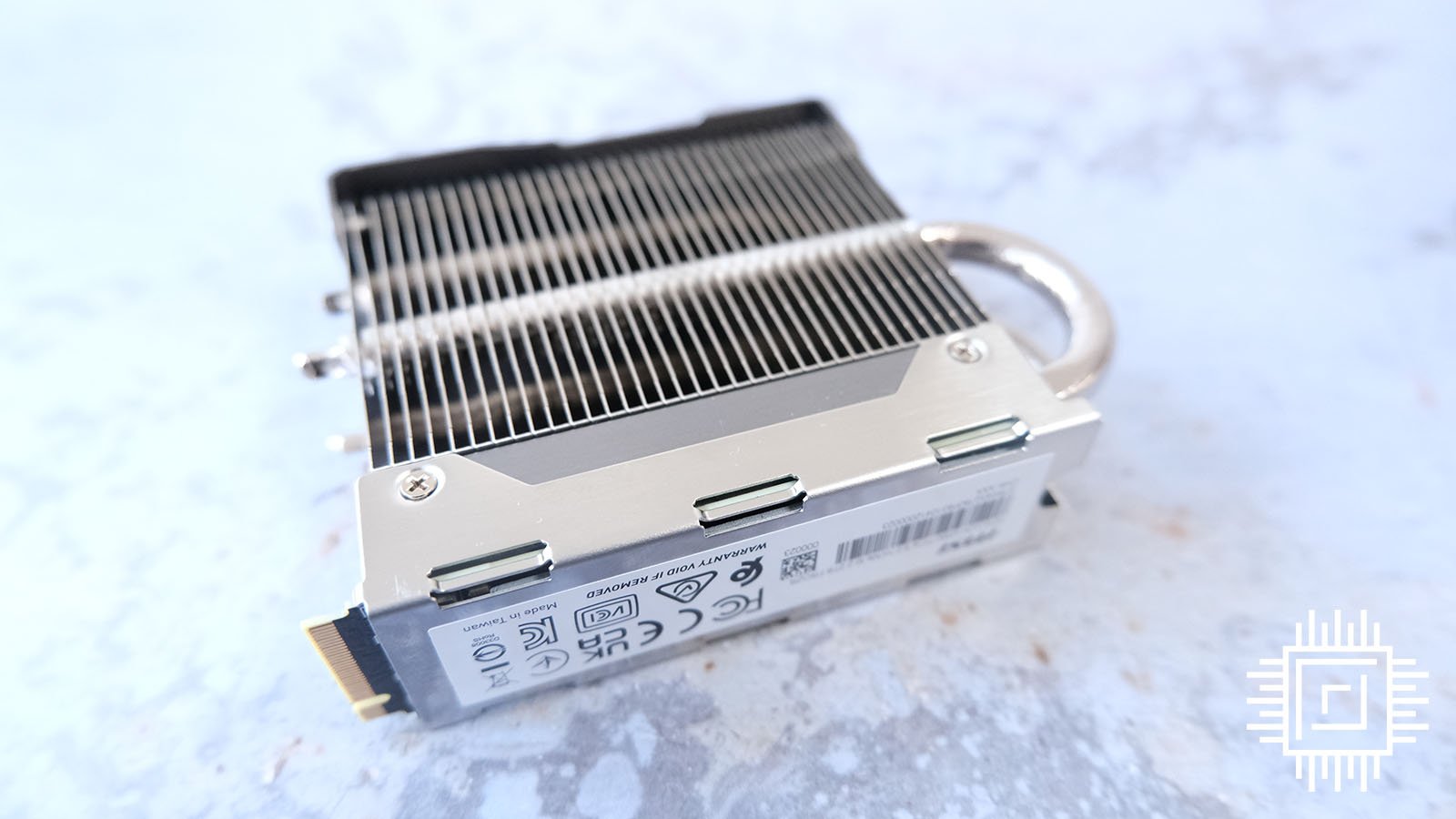
You’ve seen me before, haven’t you? Understanding the electric speed on offer, top marks to MSI for persisting with a passively-cooled solution rather than going down the active route, a la Corsair.
Like the Spatium M570 Pro, the cooling design is based on a 36-fin heatsink through which three heatpipes work their magic. Standing 72mm tall, be sure to check clearance in your system. The sheer size precludes the use of the drive in, say, a PlayStation 5, but it’s not meant for that purpose. Furthermore, though the PCB itself is presented in a regular 2280 form factor, MSI actually recommends installing in a 22110 slot. Small-form-factor PC users, caveat emptor.
There’s good news insofar as indirect cooling from the graphics card or CPU is likely to benefit SSD temperatures. The drive’s heatsink sits snugly against large CPU air coolers in most motherboards featuring a PCIe 5.0 slot next to the processor.

PCIe 5.0 SSDs naturally run hot. MSI quotes an 11.5W maximum power consumption which incidentally is the same as the M570 Pro. Though it may sound high, removing that amount of heat is relatively easy for a decent heatsink, especially one as robust as this.
MSI continues to furnish premium SSDs with a five-year warranty. Noting the 1,400TBW rating, equating to around 770GBs of writes per day on this 2TB model, I’d feel confident in the M580 lasting the course.
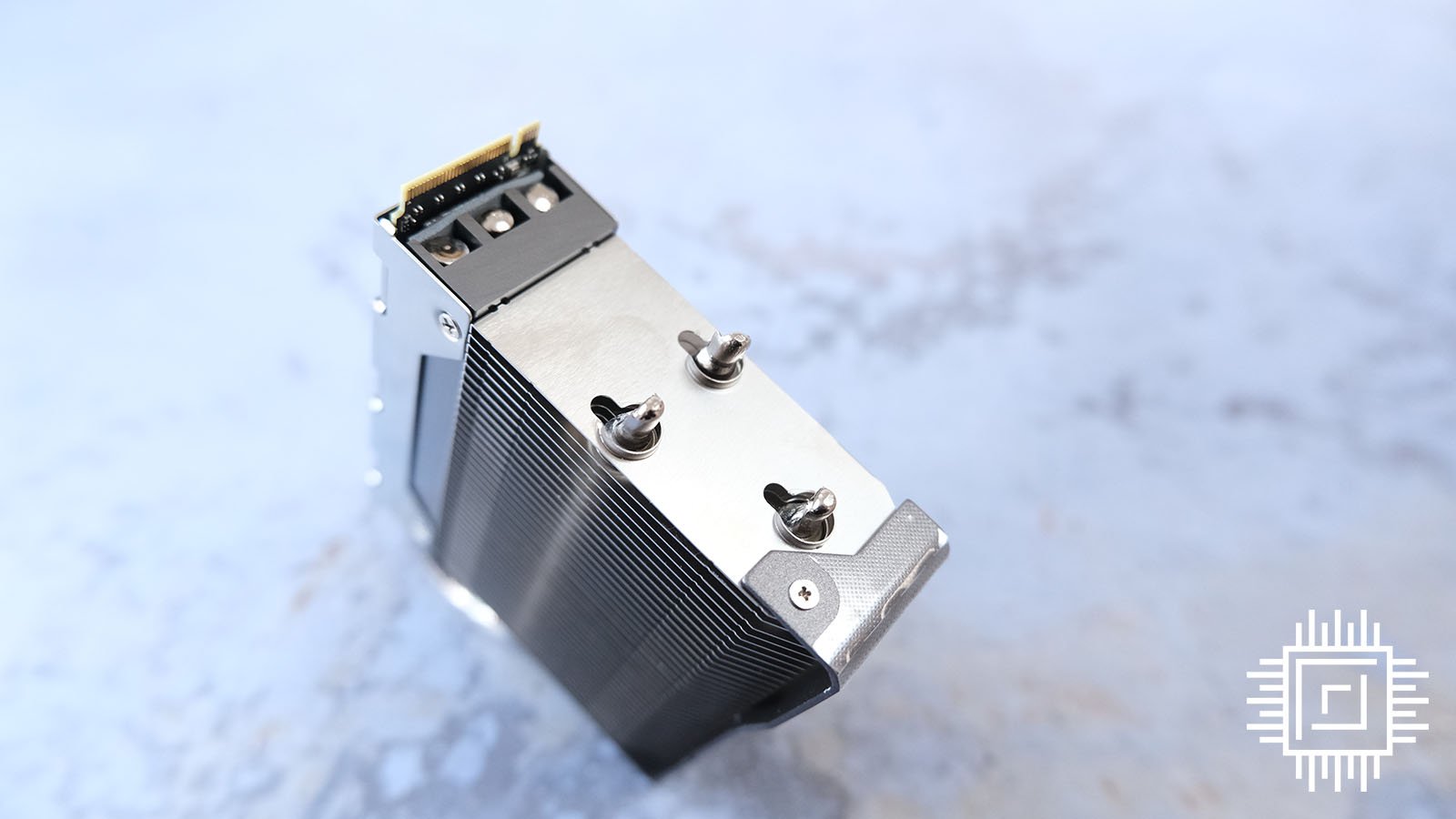
You see the three heatpipes attach to the base plate and then protrude a bit further to the right. There’s also a thermal pad present between SSD PCB and cooling, so the design is well-thought-out.
Underneath, the 2TB drive houses 4GB of SK hynix DDR4-4266 DRAM for buffering duties. There’s naturally also the E26 controller and two NAND chips.
There’s no firm pricing at the moment. Considering the M570 Pro Frozr 2TB is available for £270, I’d expect this drive to fetch around £300. Expensive, sure, but it’s the going rate for top-notch hardware.
Tested on an ASRock X670E Taichi motherboard with firmwares updated to the latest, strap yourself in for some mind-boggling numbers.
Performance
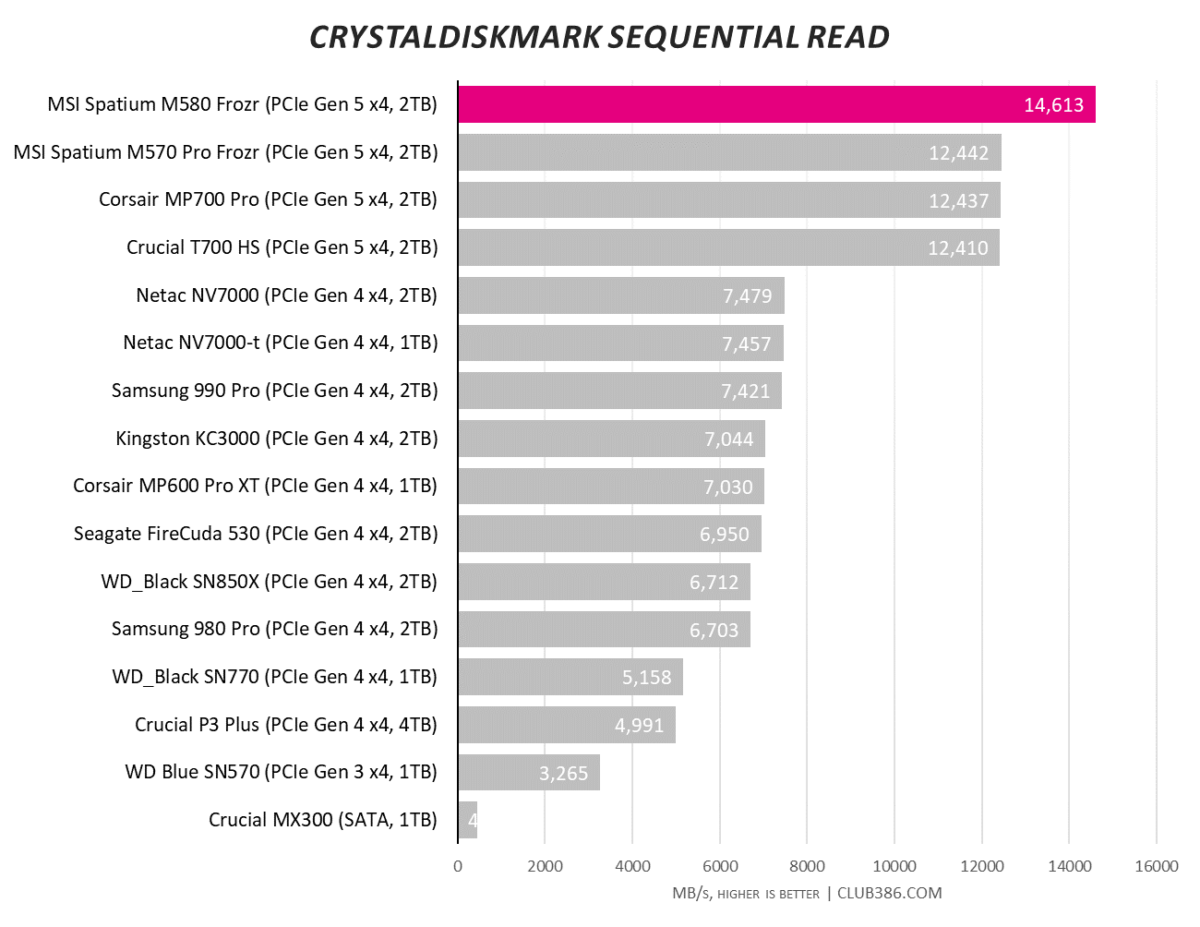
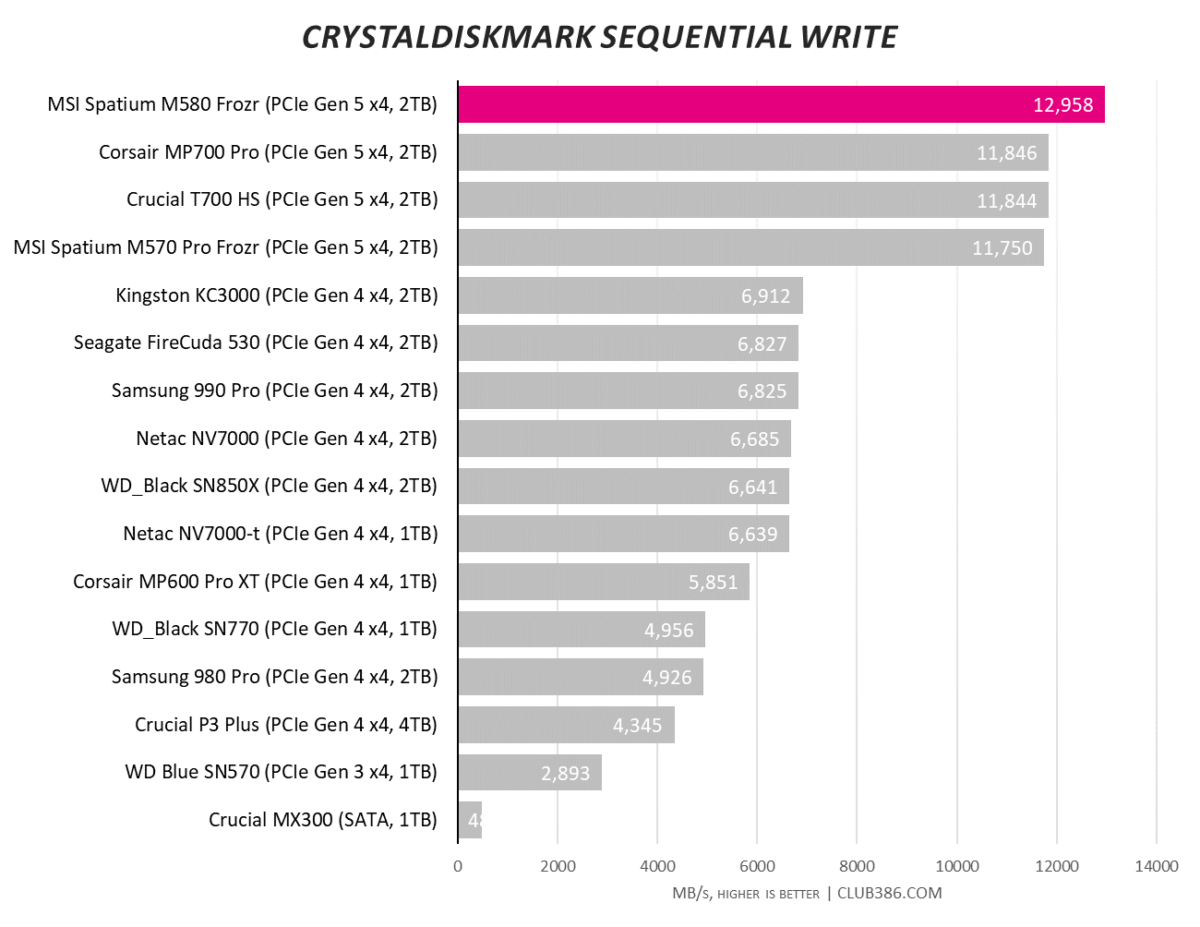
The presence of faster NAND elevates Spatium M580 to levels not seen before on consumer SSDs. There’s something wonderfully satisfying seeing straight-line numbers close in on 15GB/s.
Of course, these are synthetic results, so you shouldn’t expect to see them in real-world use when installed in a regular system.
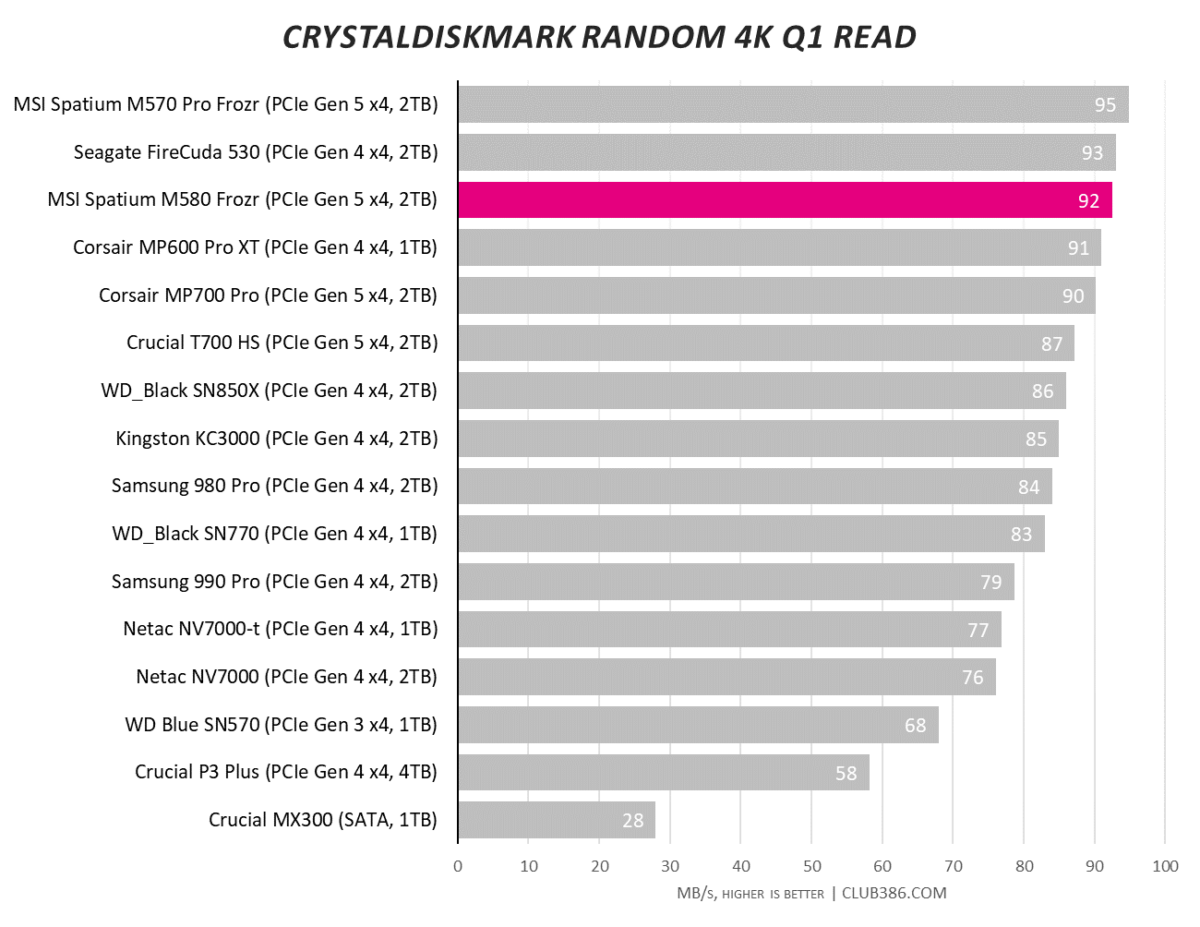
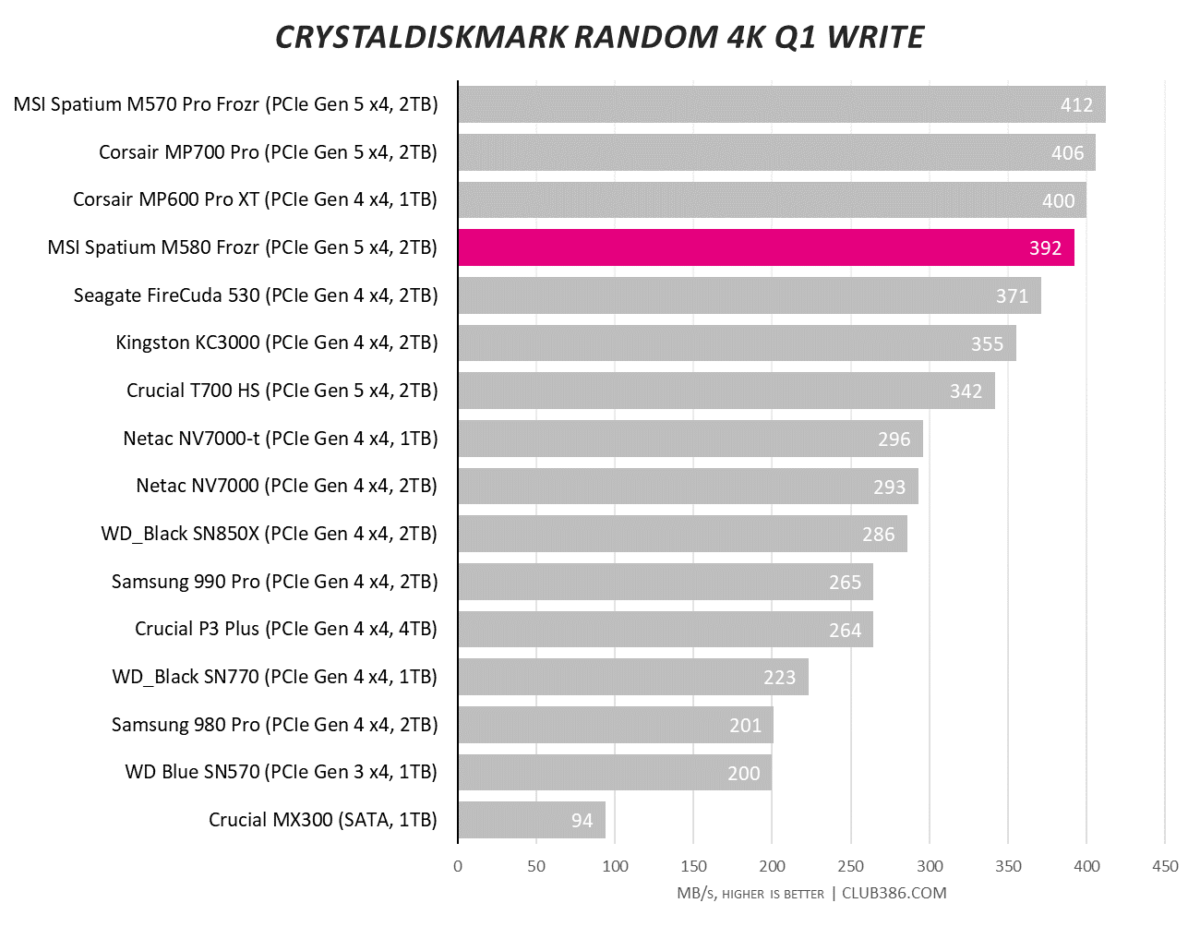
Drilling down to smaller files, Spatium M580 is slightly off the pace. There’s no real reason for this other than, perhaps, a firmware that’s not quite as well tuned as on other PCIe 5.0 drives.
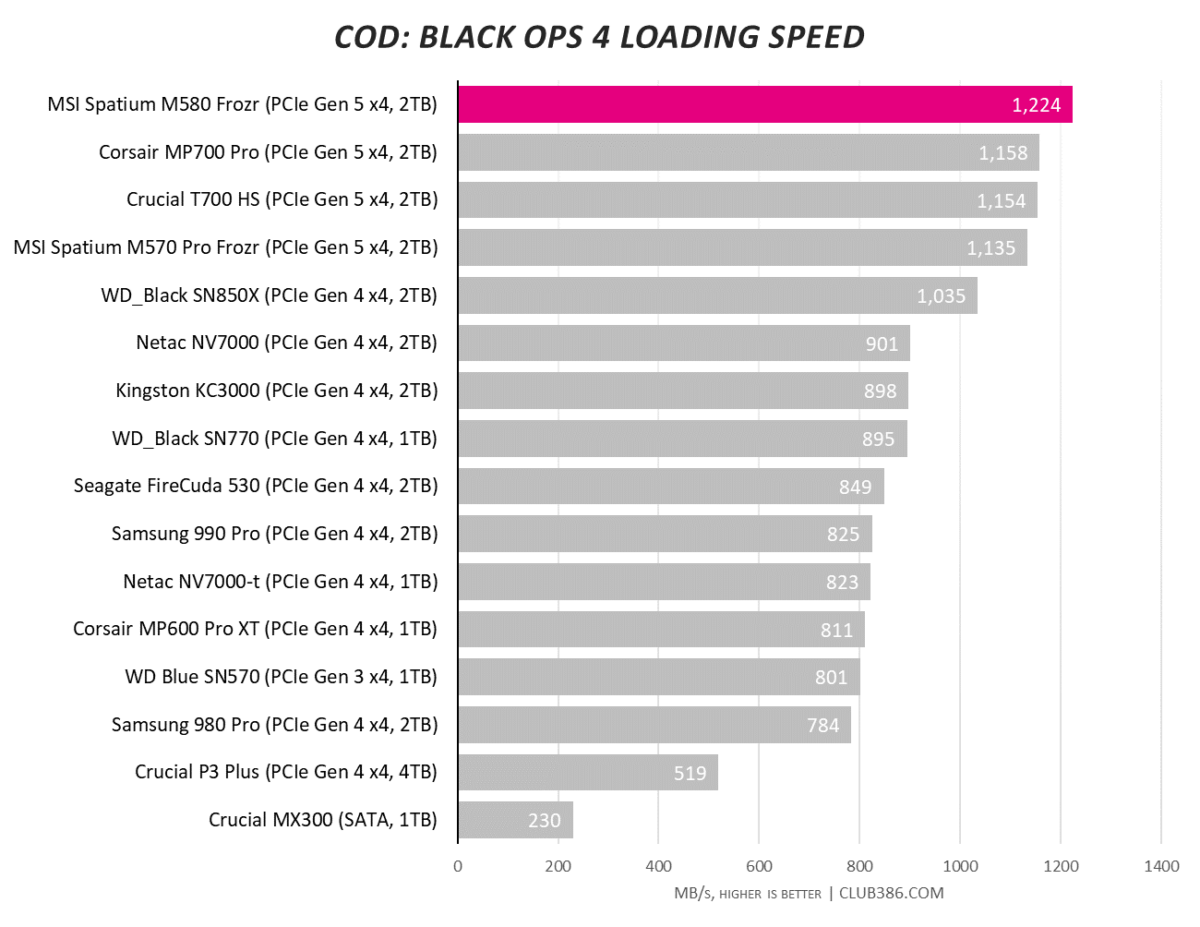
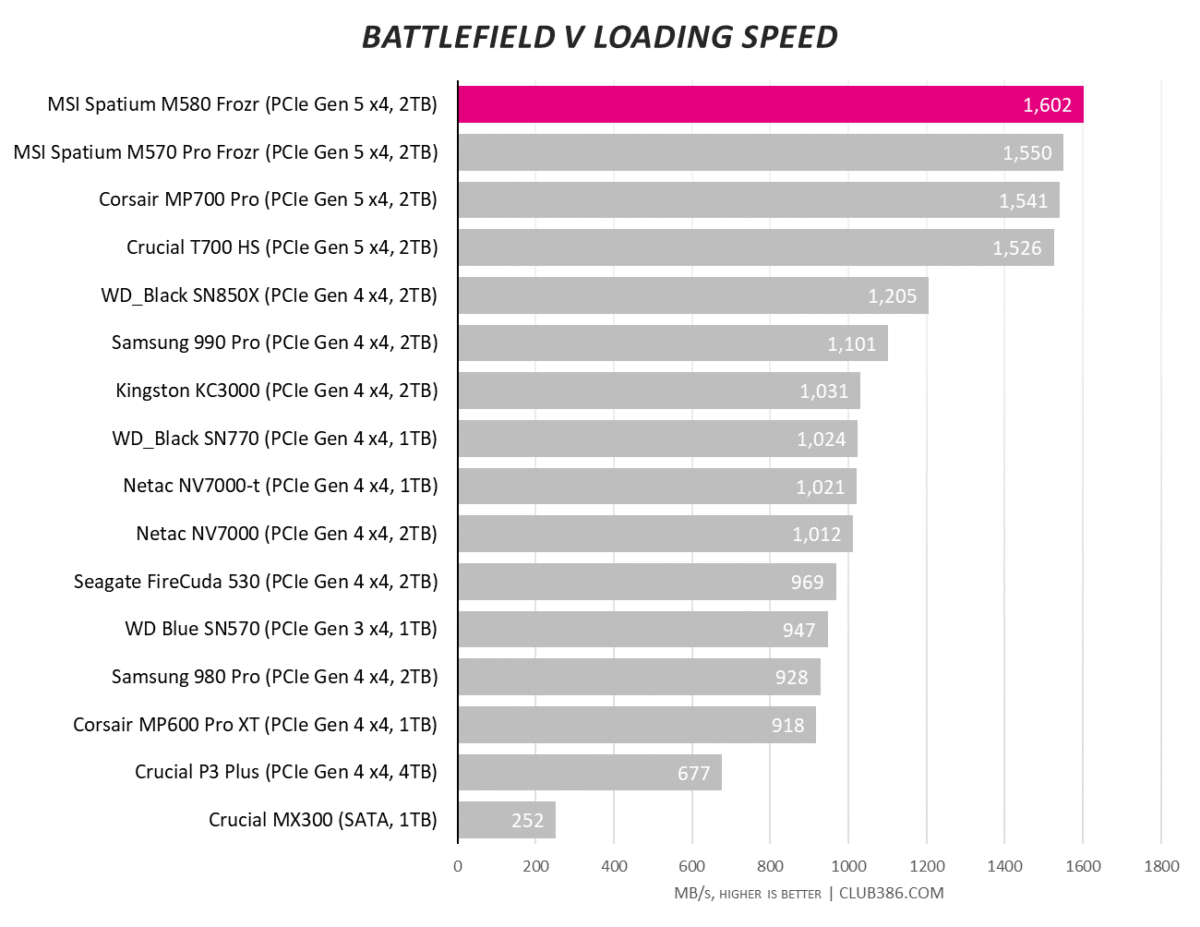
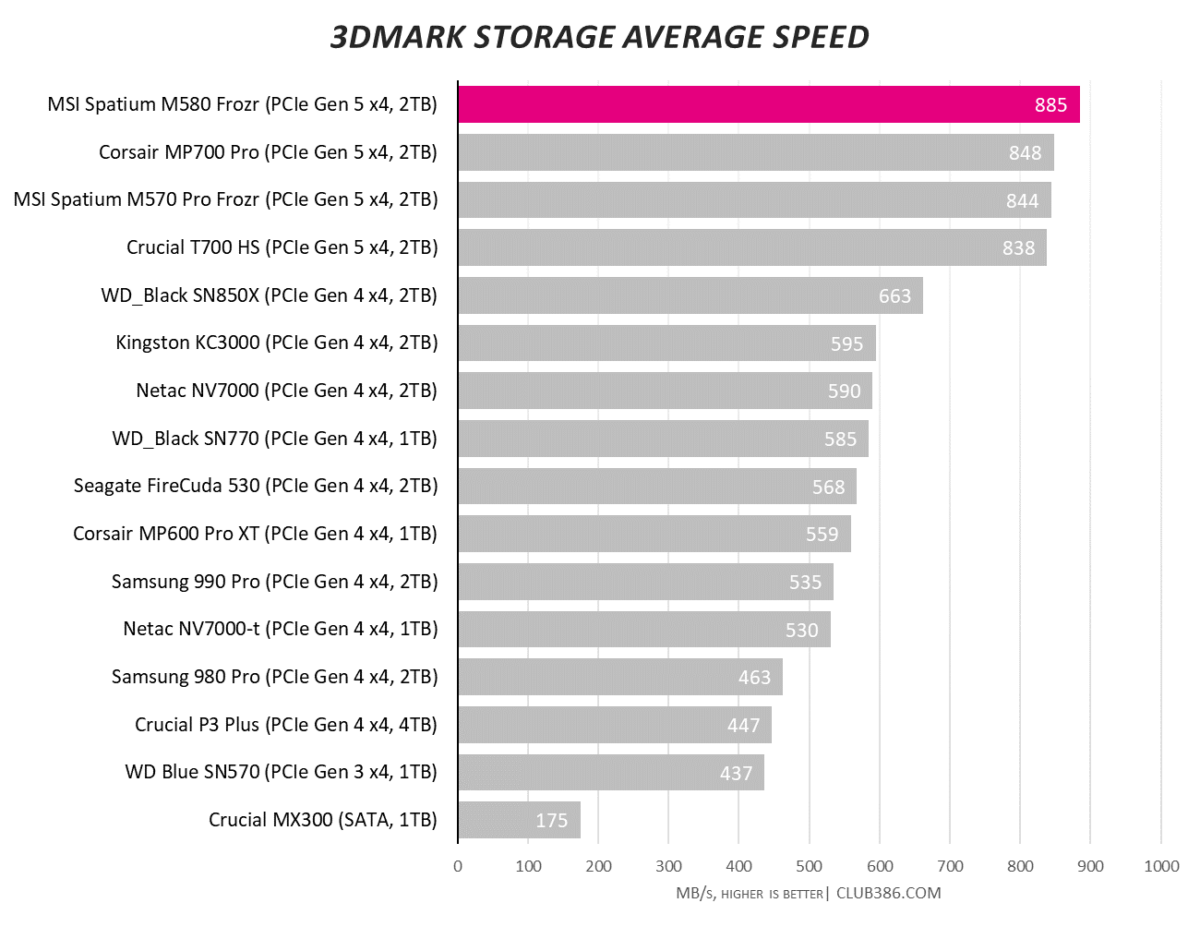
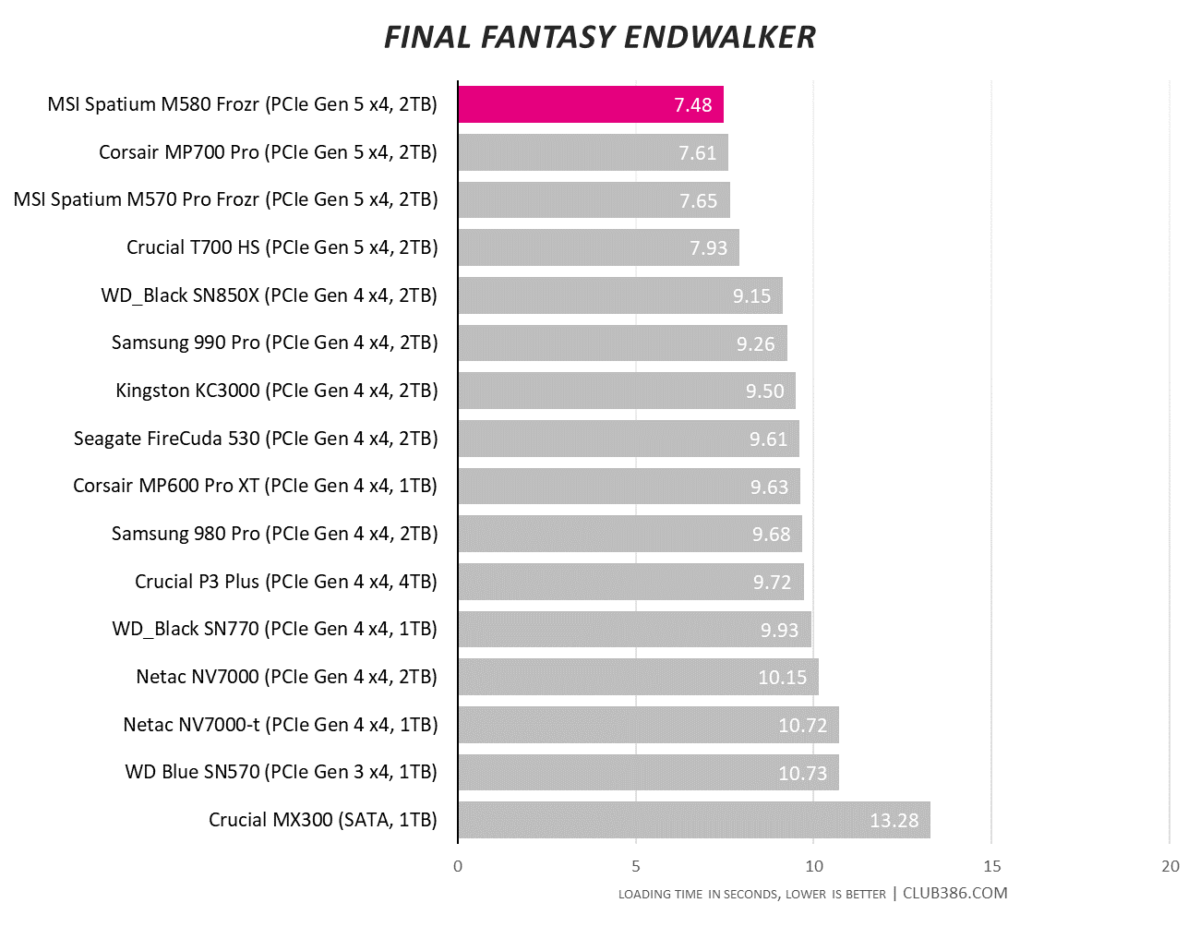
Normal service is resumed in further gaming tests. Spatium M580 Frozr delivers drool-worthy results.
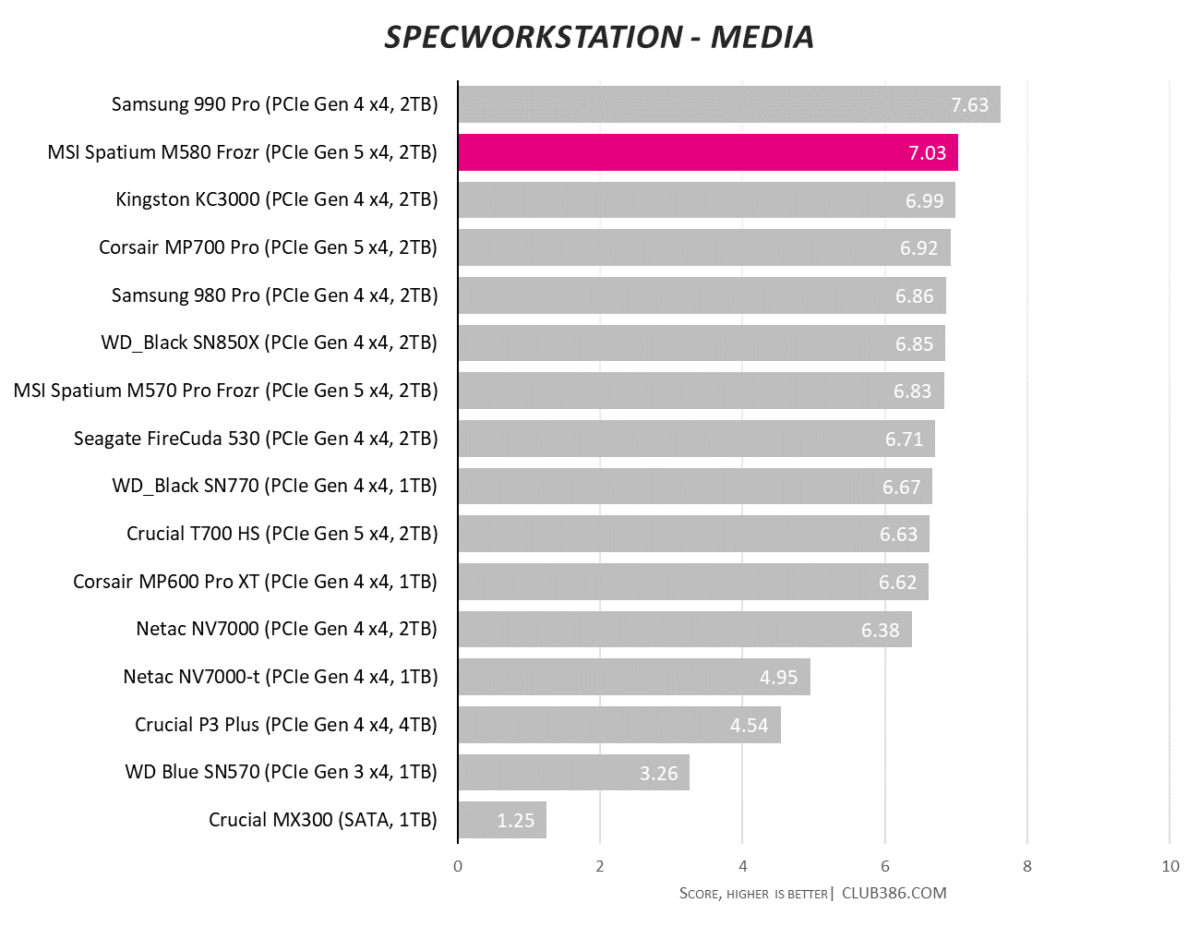
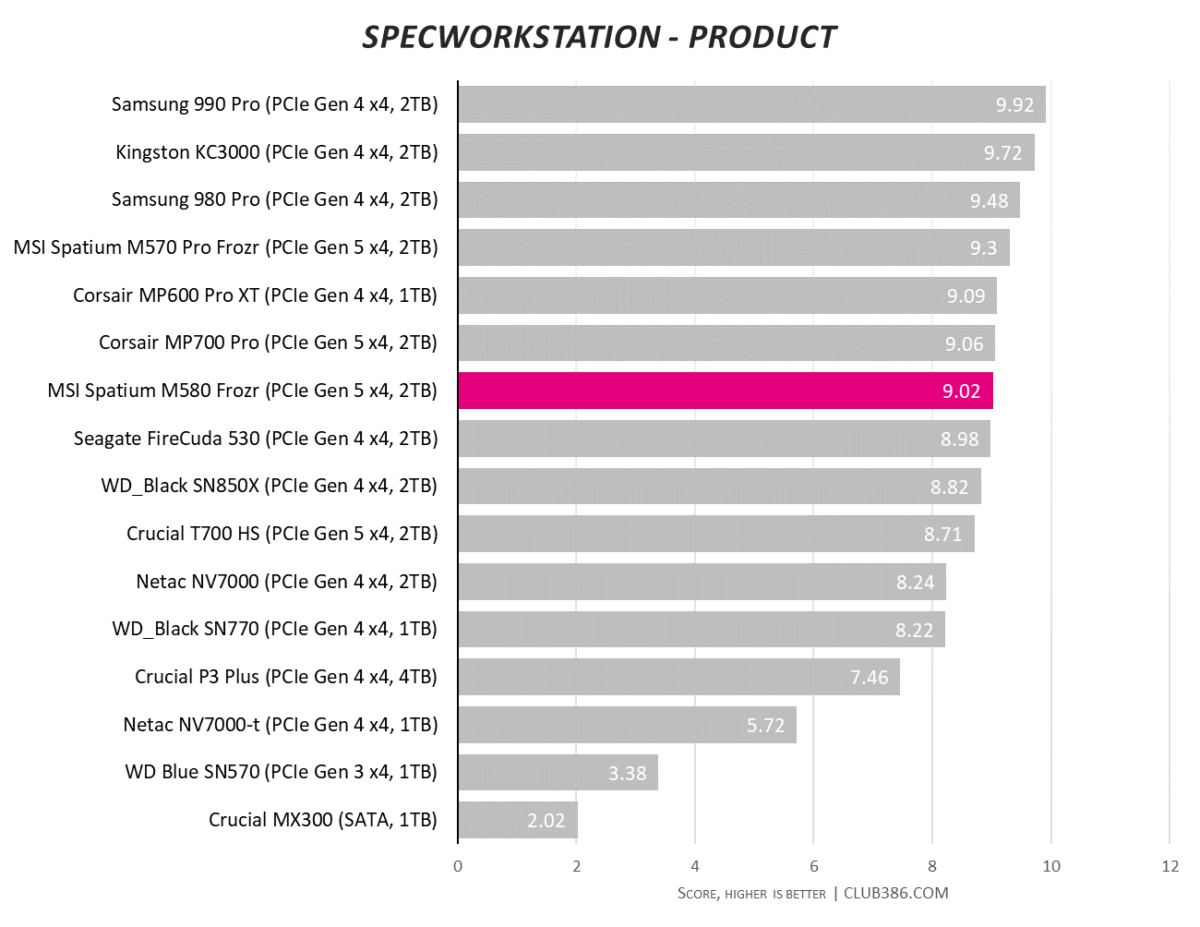
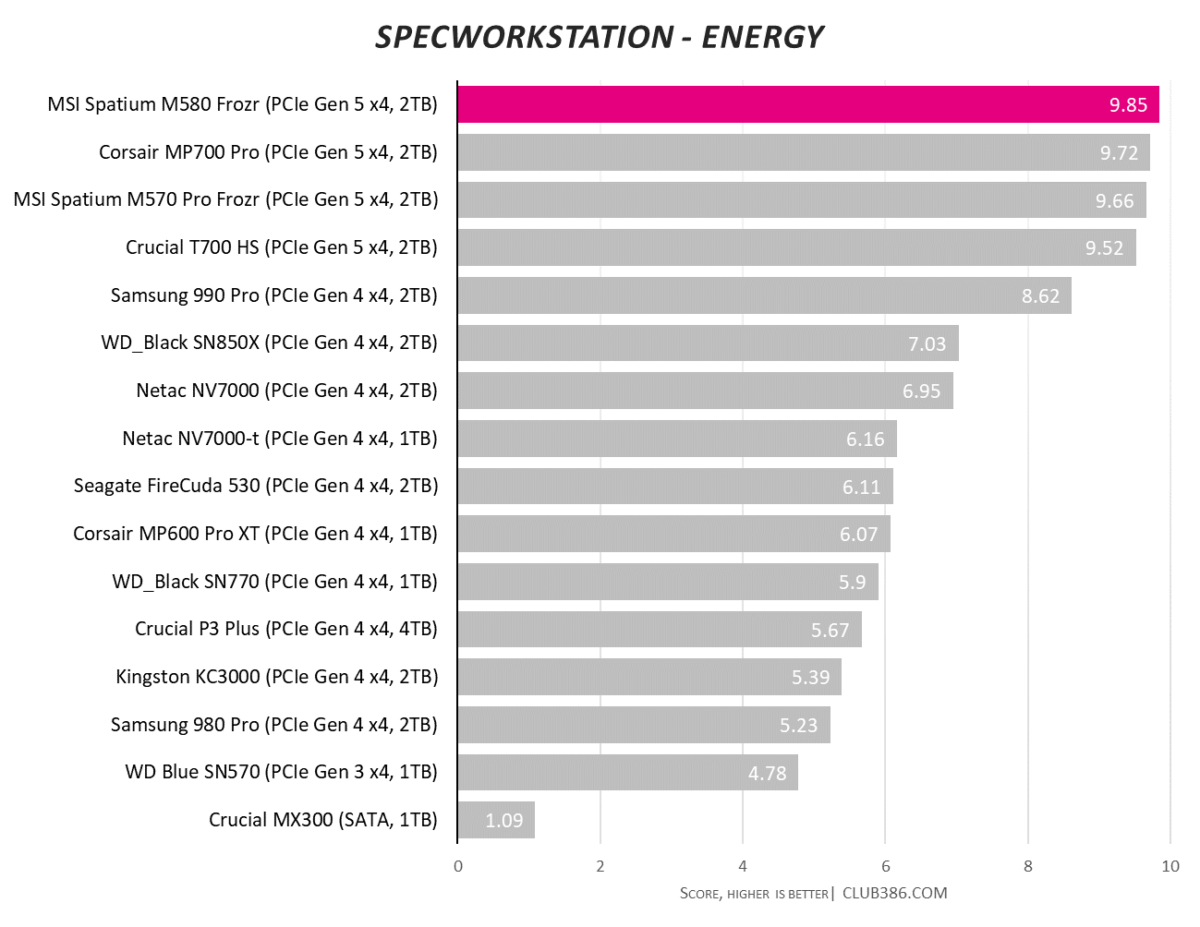
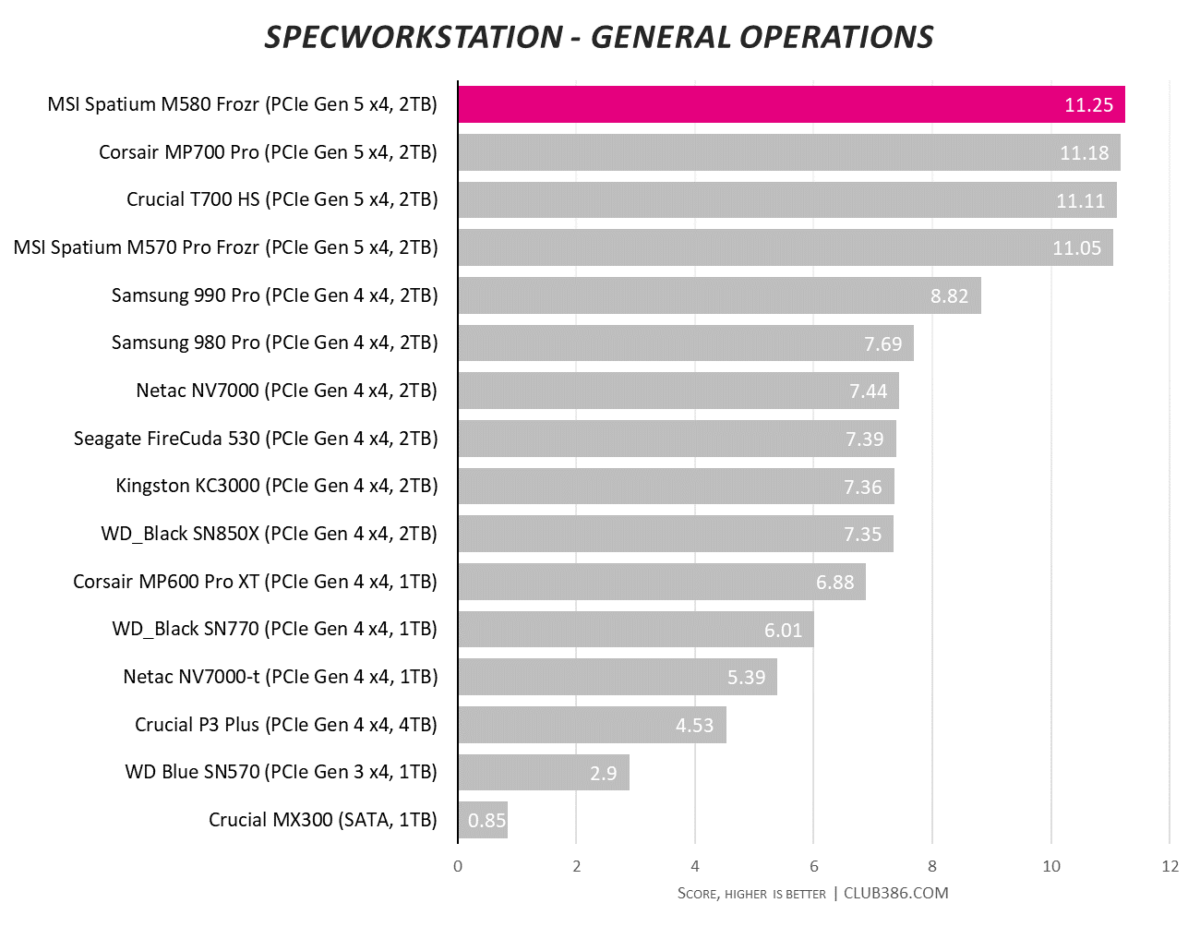
Jumping into more difficult loads, the workstation-specific SPEC benchmark shows that PCIe 5.0 SSDs generally boss proceedings. Nevertheless, being fair, depending upon particular subset, the gap isn’t huge to decent PCIe 4.0 models that are around half the price. You pays your money and makes your choice.
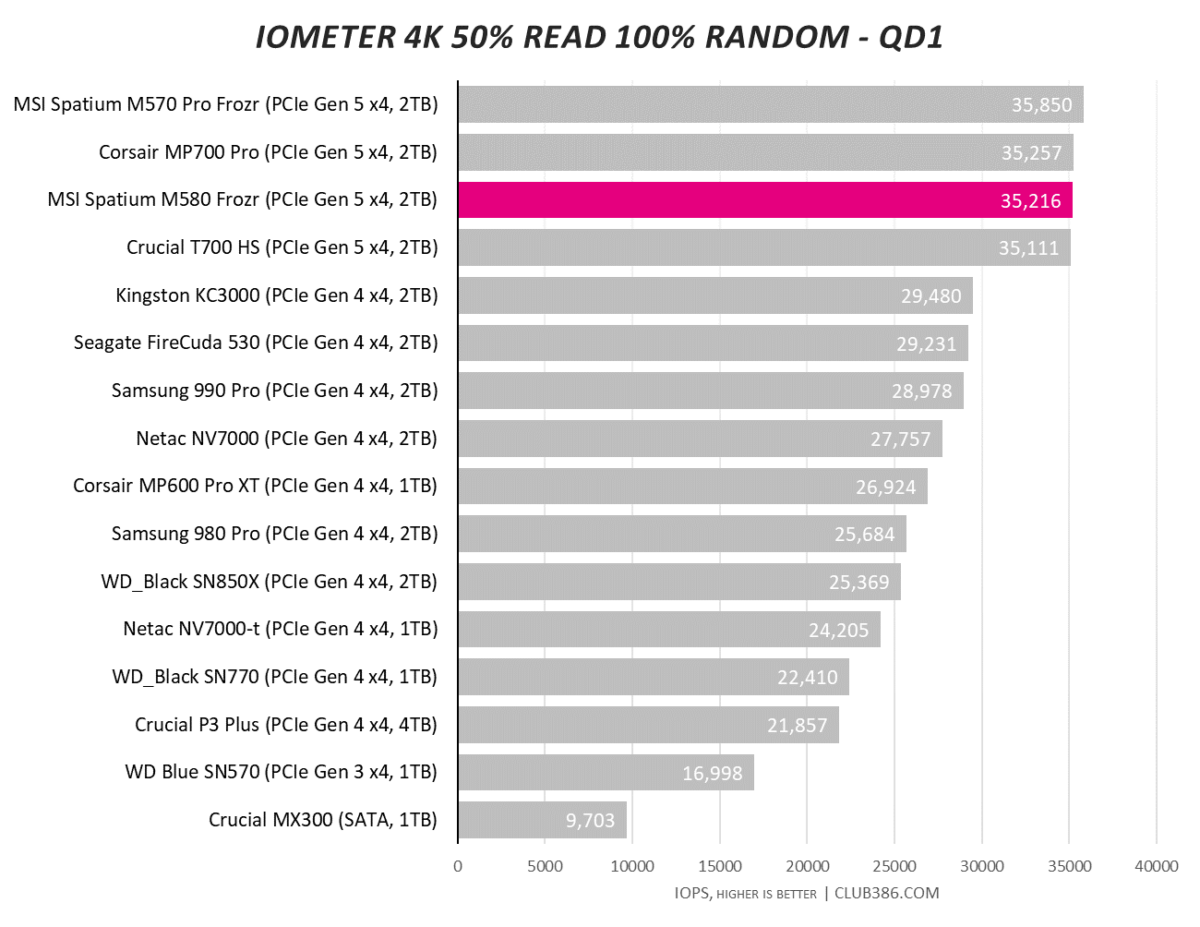
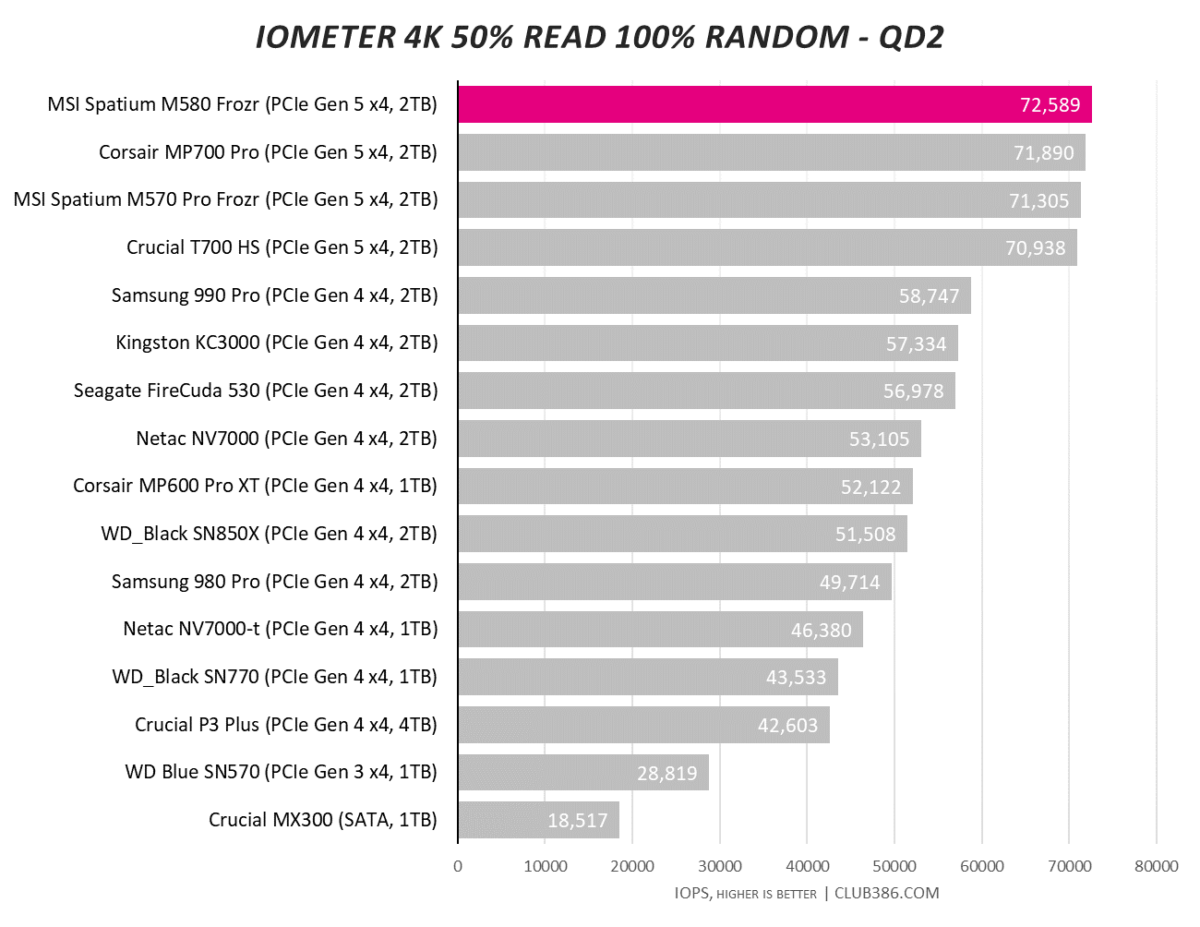
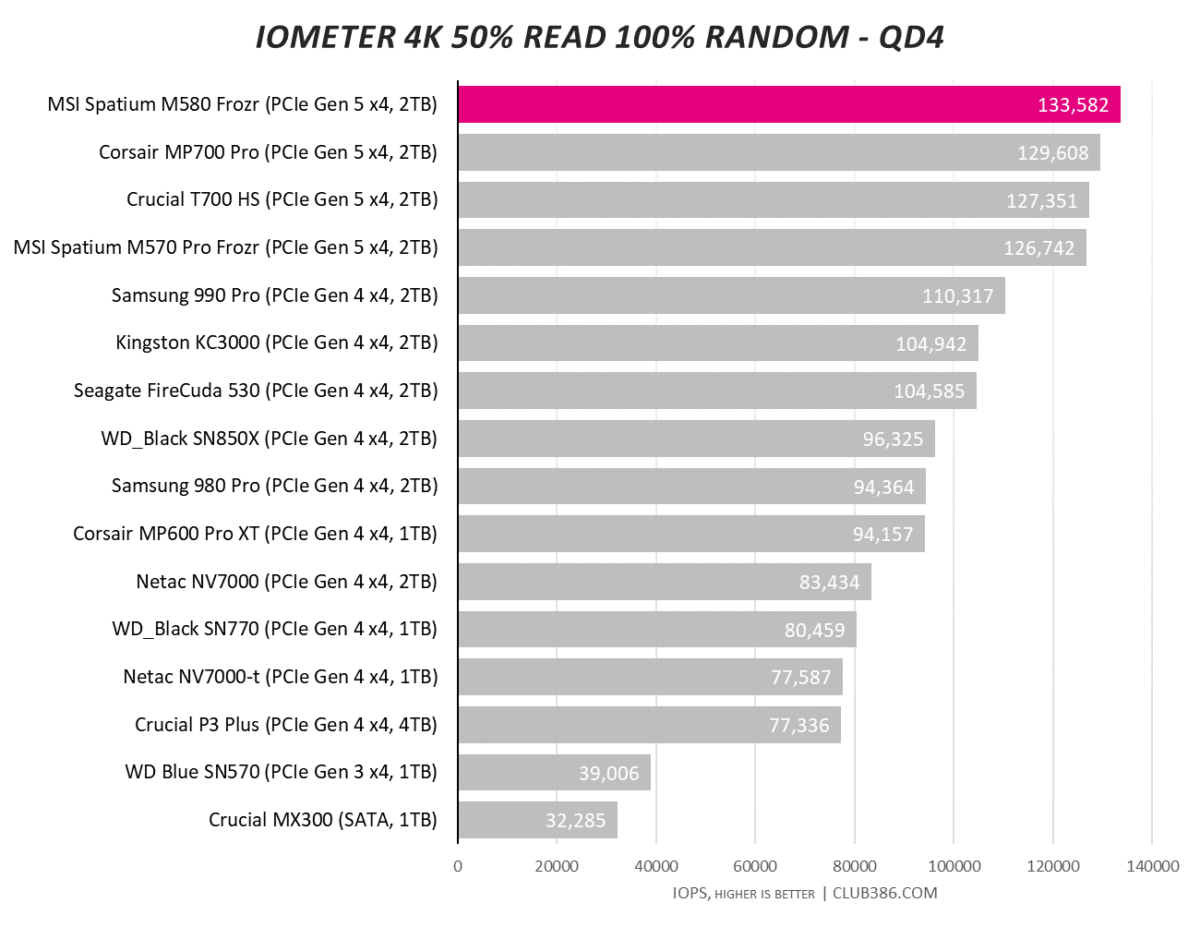
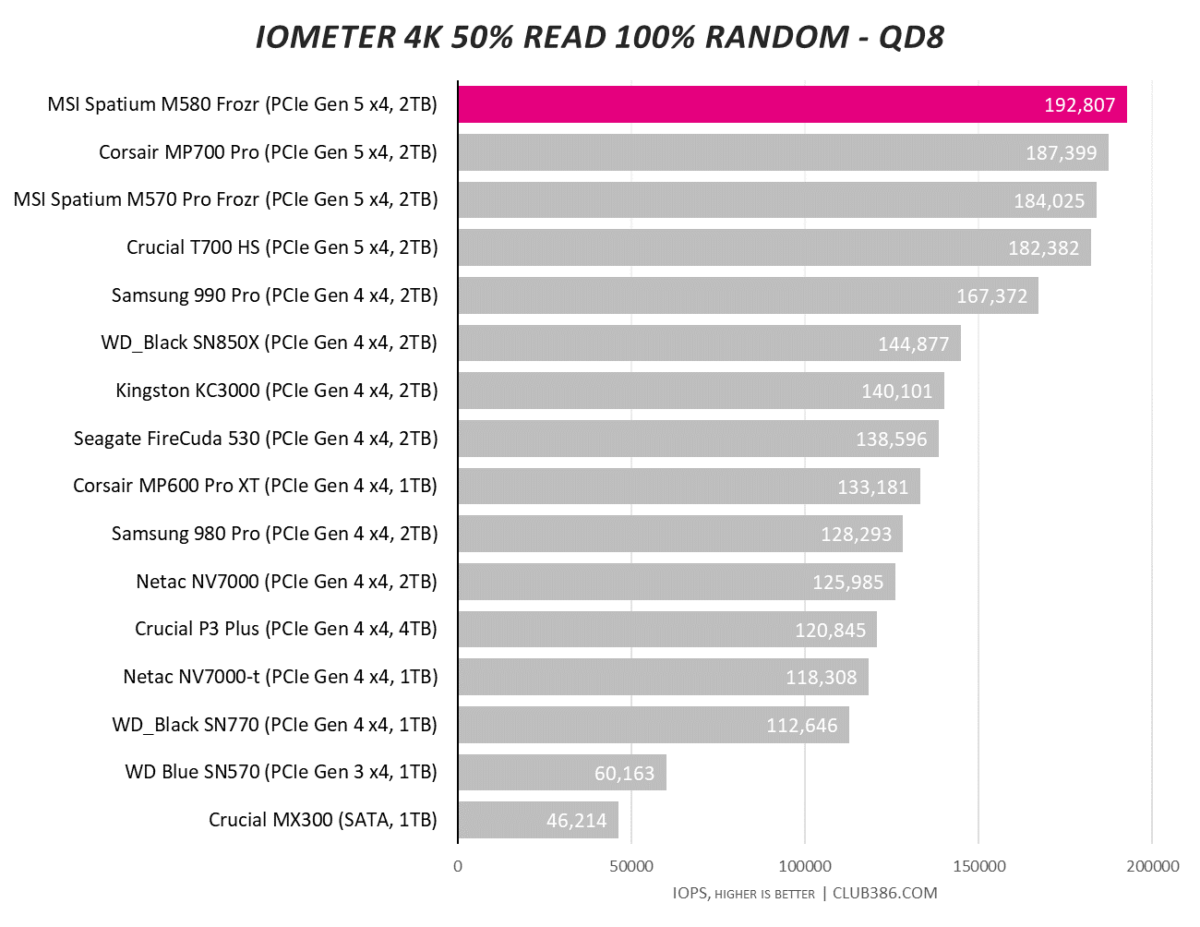
Iometer is a great tool for separating the SSD wheat from the chaff. As expected, the higher throughput of Spatium M580 Frozr leads to minor gains over the competition when the going becomes toughest.
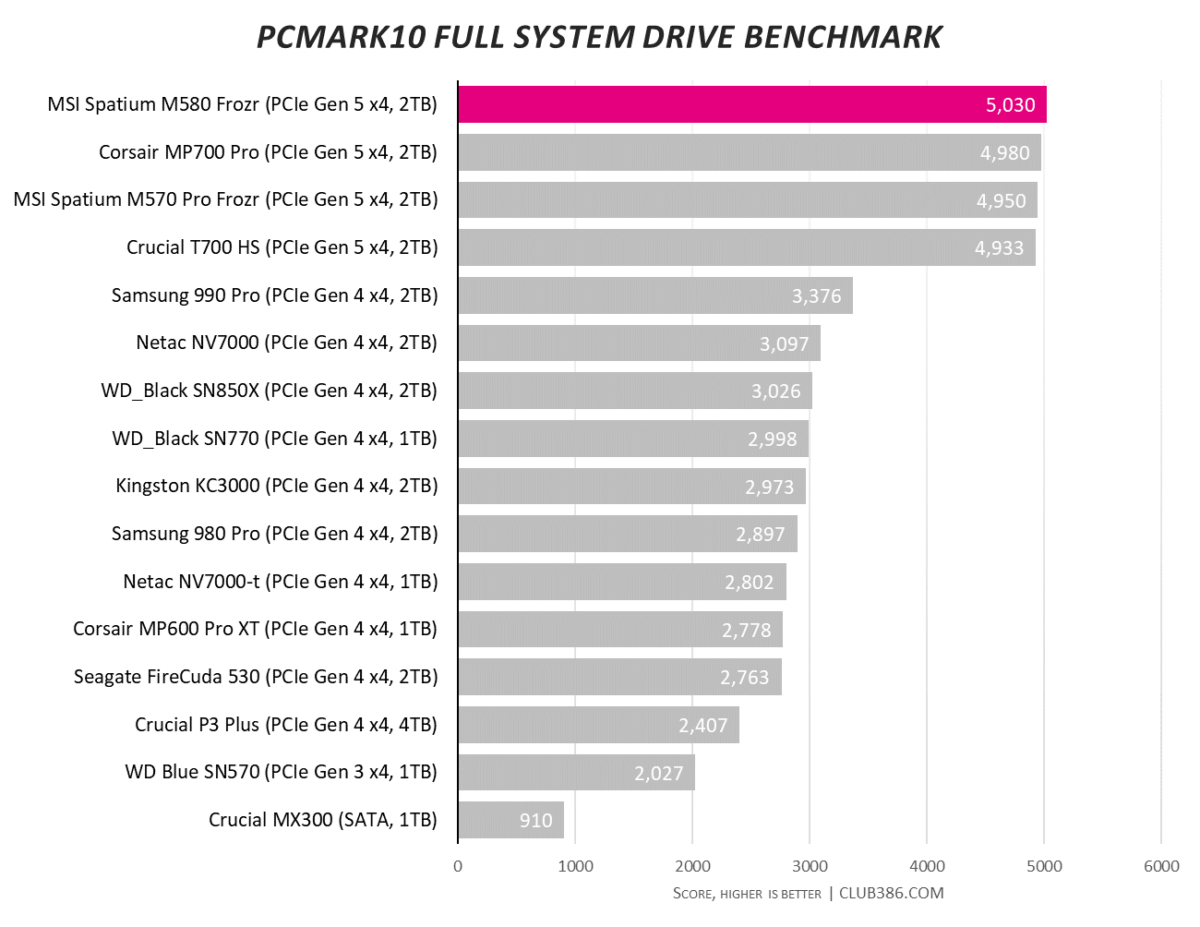
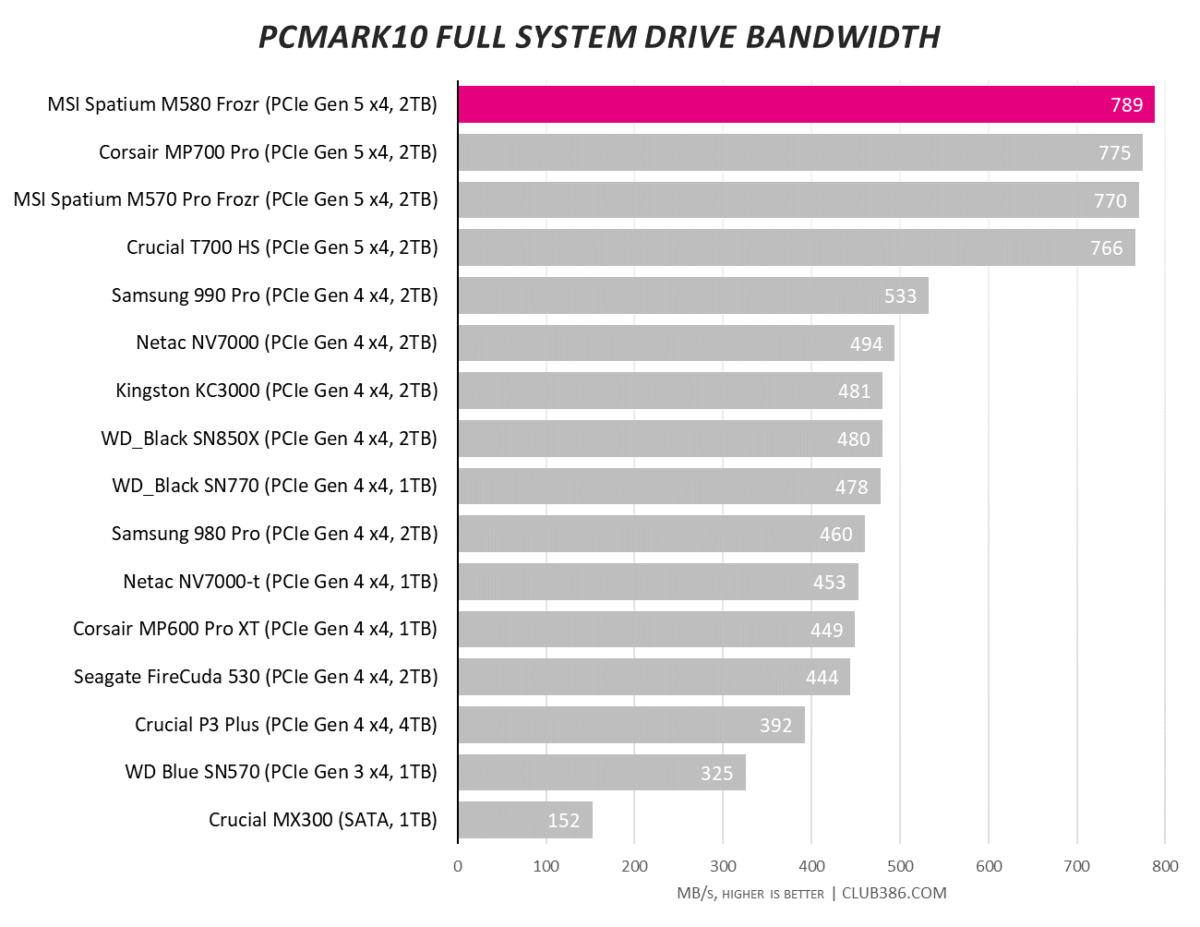
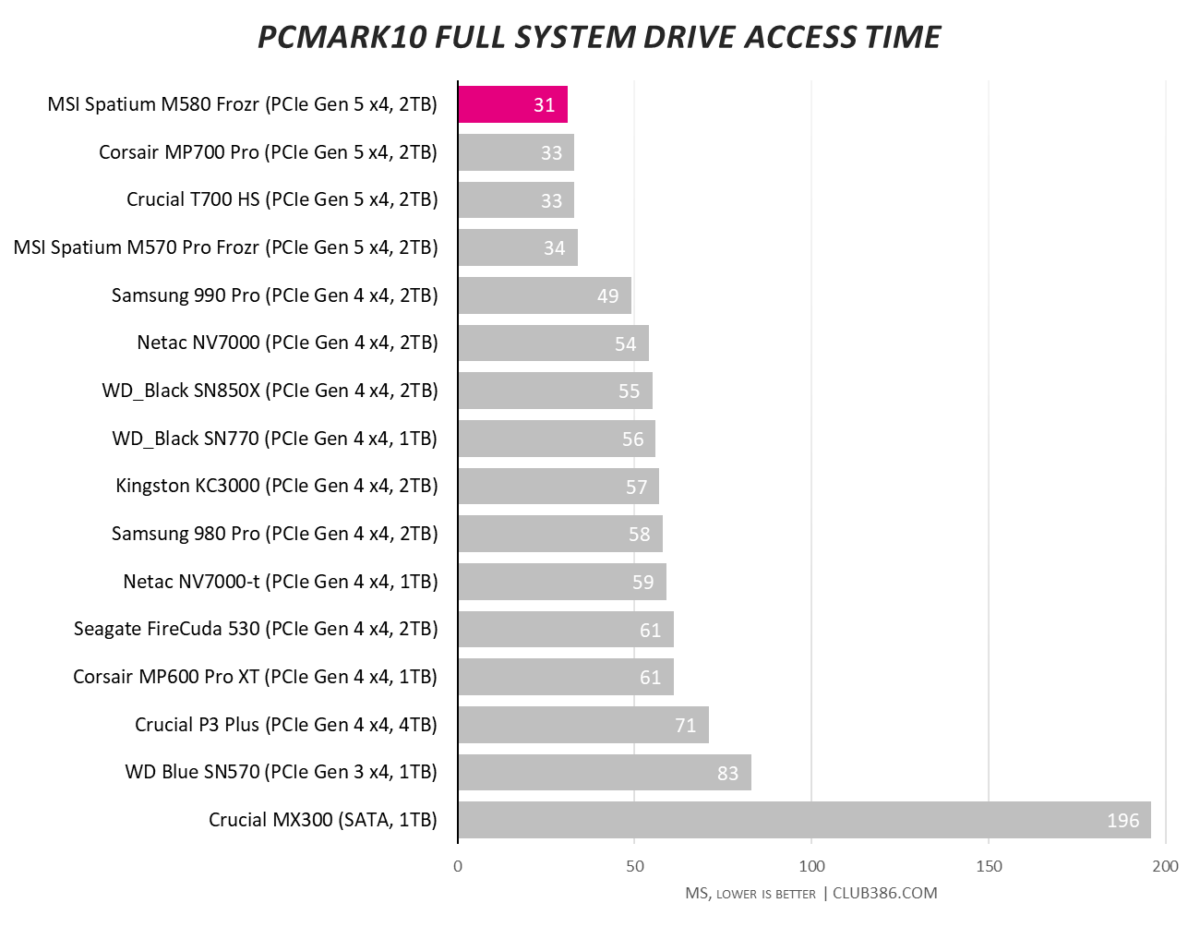
Rounding out an excellent set of results, Spatium M580 Frozr nips ahead of all other drives.
A note on real-world usage. Moving large files around, the drive’s SLC caching mode is exhausted at around the 210GB mark. More than enough for most users who frequently shift multi-GB files.
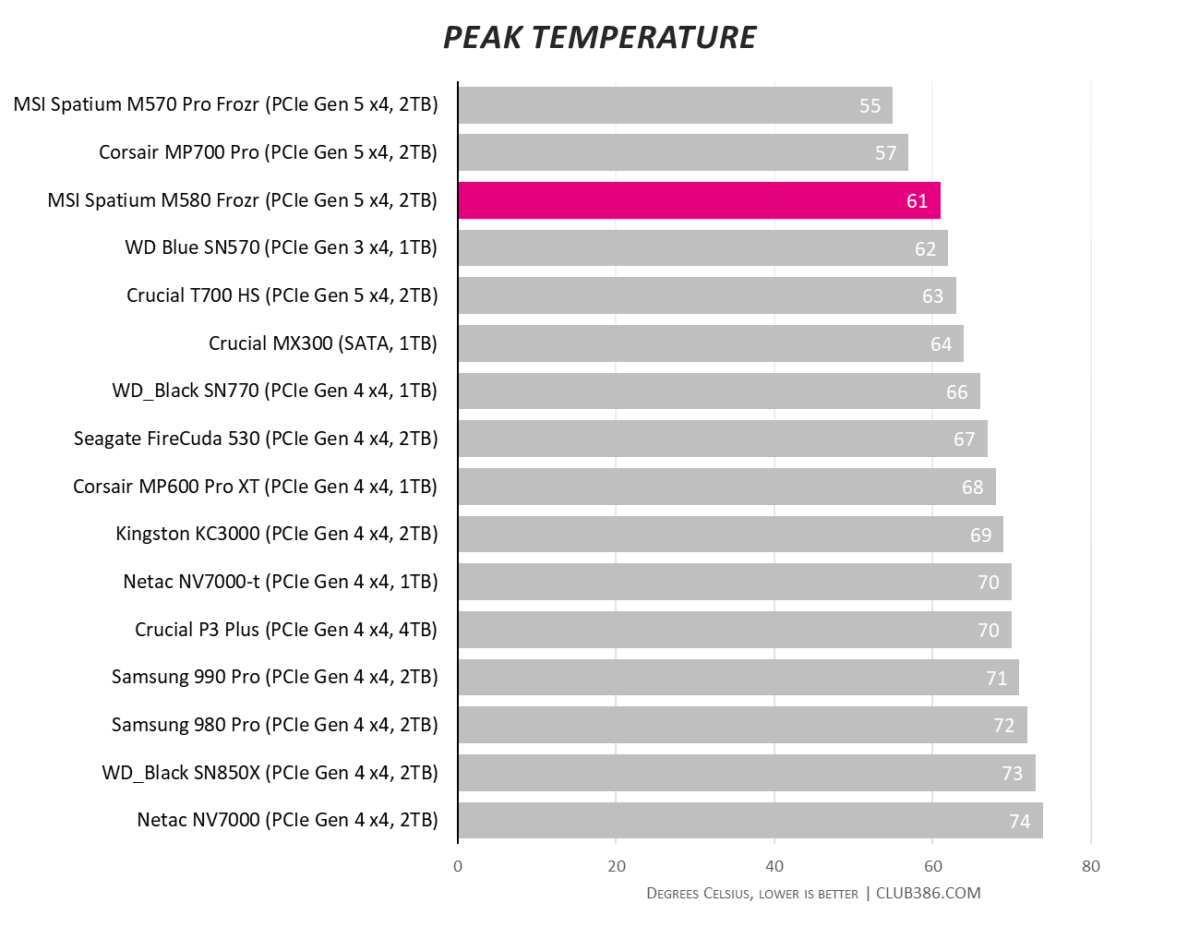
The heatsink is rather impressive at removing heat away from the drive. I noticed no evidence of thermal throttling throughout testing. Assuming you have a chassis with reasonable ventilation, I can’t imagine you’ll run into issues, either.
Conclusion
There is no shortage of choice at the upper end of the consumer SSD market. The segment is dominated by a tried-and-trusted combination of the Phison E26 controller and Micron 232-layer TLC NAND. Adding a sprinkling of additional oomph, the very latest flash enables PCIe 5.0 drives to run that bit quicker.
MSI jumps on this opportunity by releasing the Spatium M580 Frozr. Offering staggering straight-line speed and equipped with the best passive SSD cooler I’ve come across, this here drive puts itself in the shop window as the storage of choice for a no-expense-spared PC.
To be fair, performance benefits are incremental over other PCIe 5.0 drives, but that is wholly expected. I don’t imagine the industry will see faster consumer SSDs for a while, so if you want to brag about loading speeds and know your system is carrying the best of the best, look no further.
Verdict: The fastest SSD we have ever tested, period.


